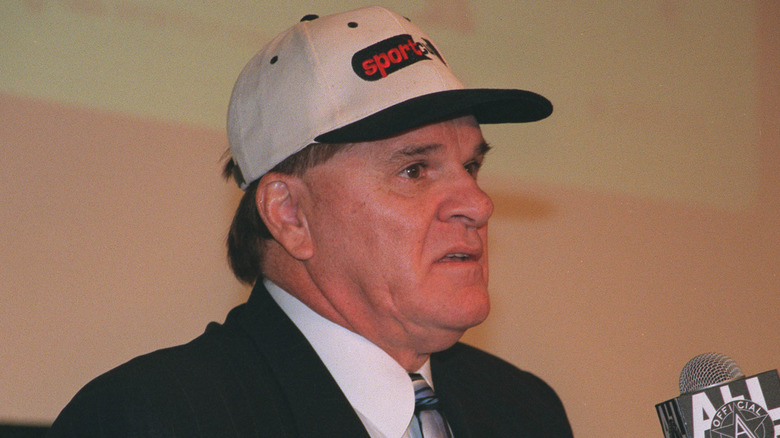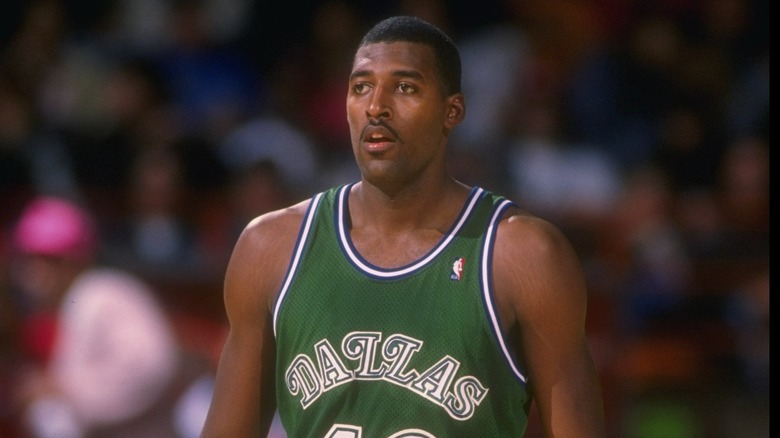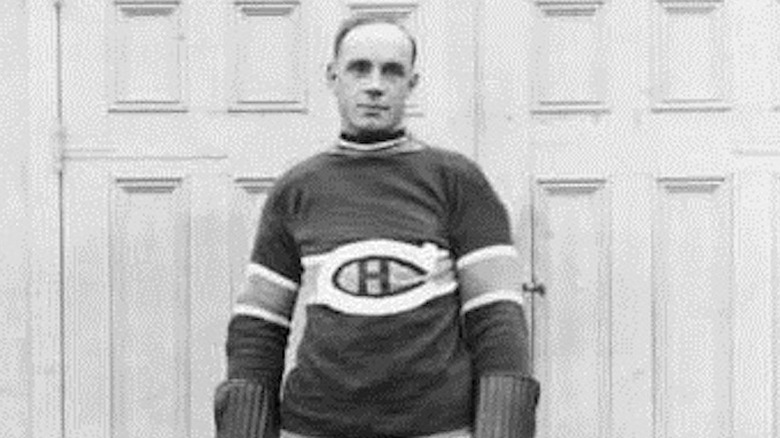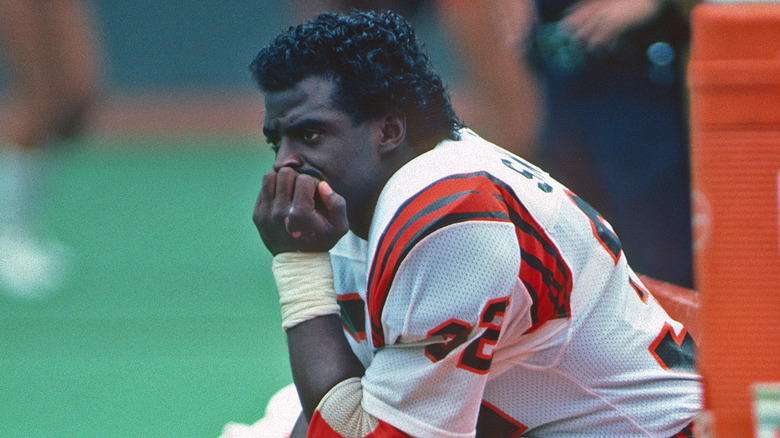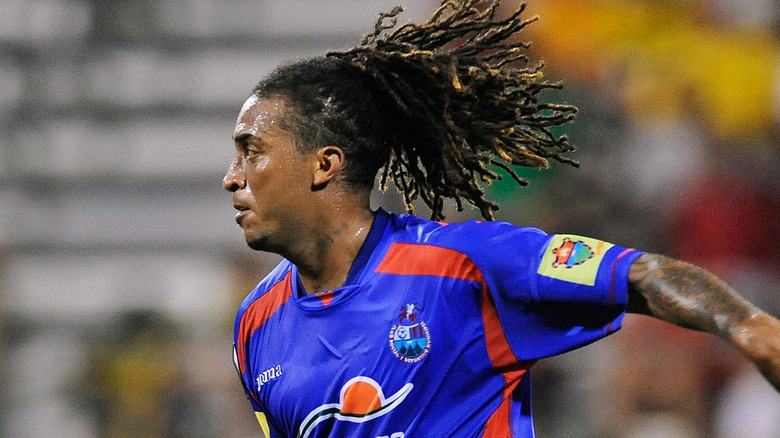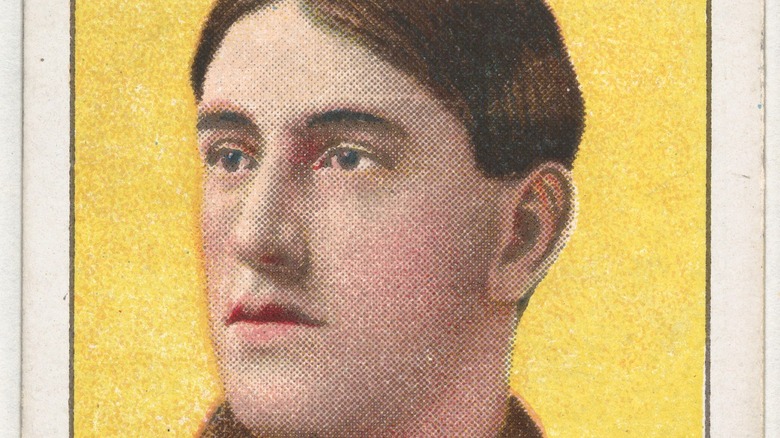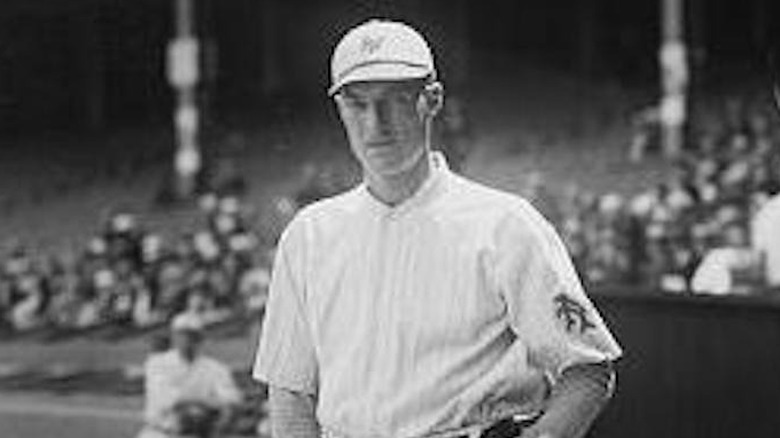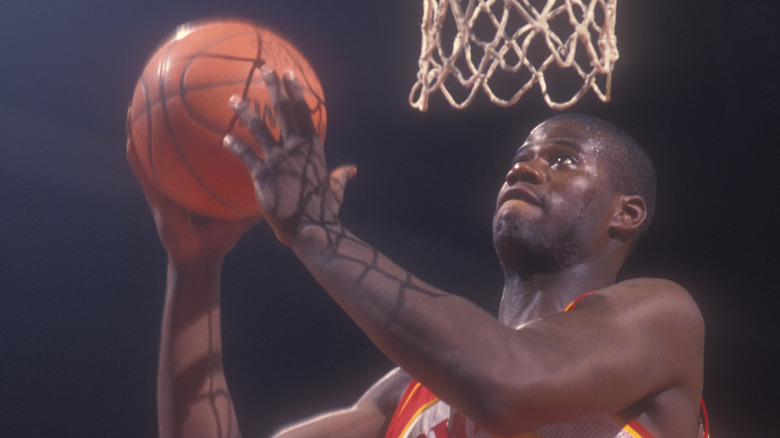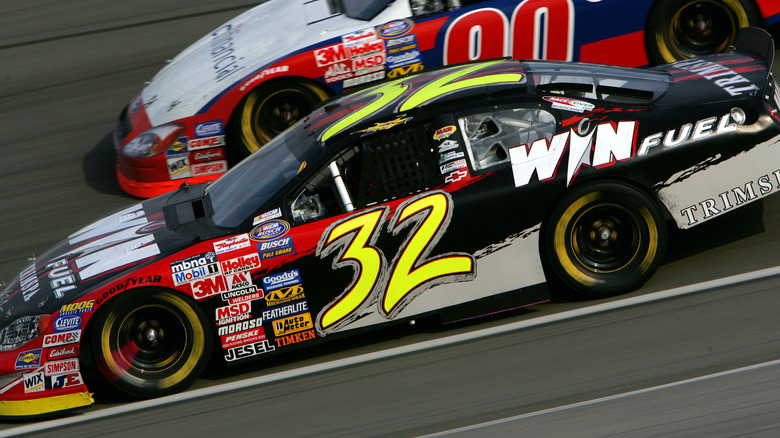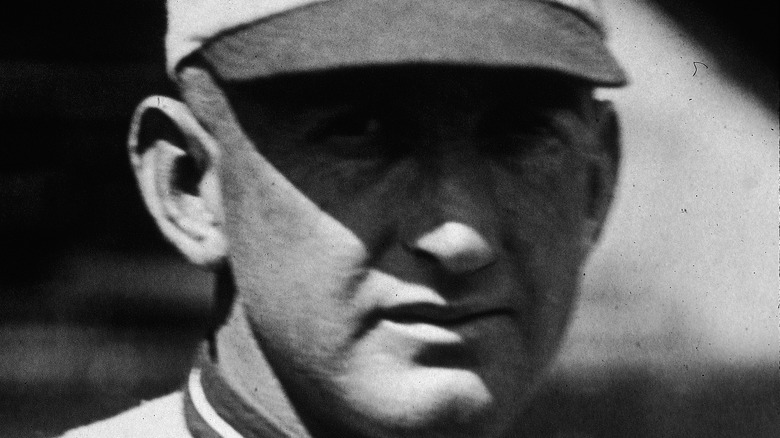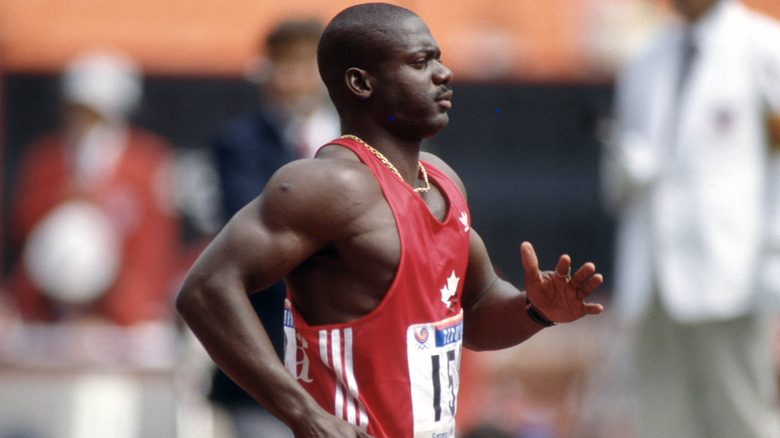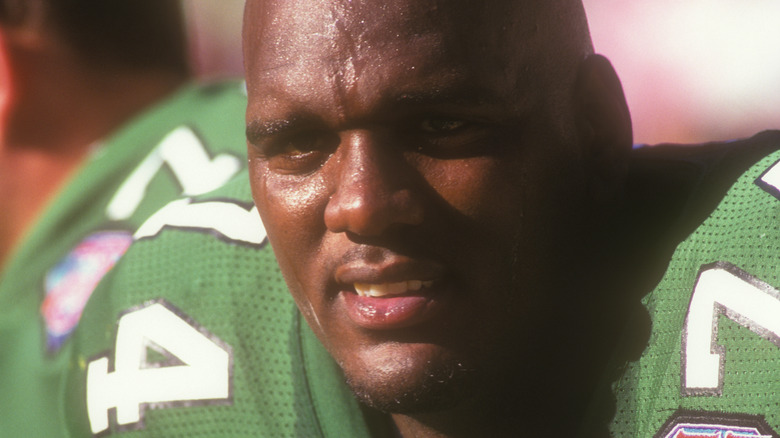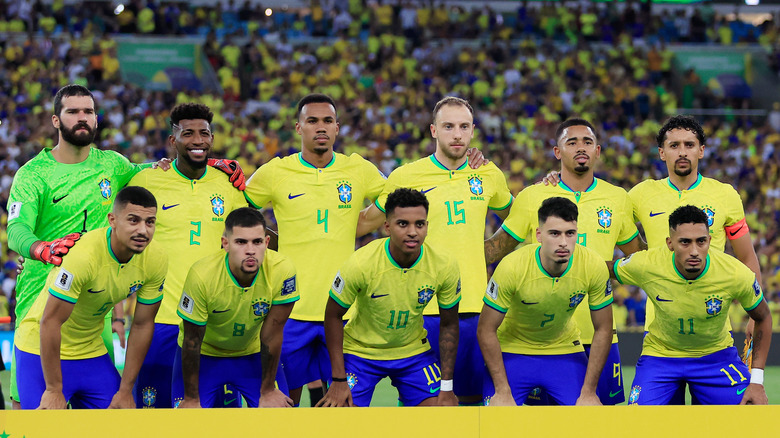The Real Reasons These Athletes Were Banned For Life
In a 2021 interview with Jimmy Fallon, Olympic gold medalist Simone Biles revealed that ahead of her second Olympic games, she was training seven hours a day, six days a week. At just 24 years old, she had invested more time into her sport than many of us have invested in ... anything.
And Biles isn't alone in having spent thousands of hours practicing her skills. Nearly every professional athlete who has set foot on a court, field, rink, or track has spent a hugely significant chunk of their life trying to realize their athletic dreams. So you would think, given everything they've poured into it, most pro athletes would do everything they could to ensure they could have a long, prosperous career, including staying away from all the things (drugs, steroids, gambling, cheating) that could threaten it. But that certainly isn't the case.
Over the last 100 years that the US has had professional sports leagues, plenty of athletes have done things that have wound up getting them banned. In the most extreme cases, some were banned for life.
Pete Rose
As a player, Pete Rose is legendary. The baseball star spent most of his 23-year career playing for the Cincinnati Reds at first, second, and third base and left and right field. He was so talented that he was voted National League Rookie of the Year following his first season in 1963 and earned a spot on the National League All-Star team a whopping 17 times.
In 1984, Rose also became the Reds' manager, a position he would hold until 1989. His actions while in this role eventually would get him banned from baseball for life. In March 1989, the MLB announced it was investigating Rose regarding unnamed "serious allegations." The next day Sports Illustrated published an exposé that detailed Rose's habit of gambling on games his team was playing in, an action that directly goes against Rule 21(d), prohibiting personnel from gambling on any game in which they must perform. He initially denied placing the bets, but eventually accepted a spot on the MLB's permanently ineligible list, which, for many fans, was an admission of guilt.
It wasn't until the release of his book, "My Prison Without Bars" (via The New York Times), in 2004 that Rose finally came clean about his misdeeds, admitting that he had gambled on multiple Cincinnati Reds games. In 2021, the former player launched his own gambling podcast.
Tonya Harding
In the 1994 Olympics, Tonya Harding was one of the United States' best figure skaters and a shoo-in for a medal. Not a gold medal, mind you because the US also had Nancy Kerrigan, the US Figure Skating Association's darling whose on-ice demeanor and elegance consistently earned her higher scores than Harding despite her perceived inferior technical talent.
But Harding wasn't content with silver or bronze, so she hatched a plan to improve her chances of taking home the top honor. Every party involved has a slightly different account of how exactly the plan unfolded, but here's what we know for certain happened next: a hitman (either hired by Harding and her ex-husband Jeff Gillooly together or Gillooly alone) whacked Kerrigan in the knees right before the US Figure Skating Championship. The goal was to break Kerrigan's knee so that she couldn't compete in the Championships and would be unable to skate at the Olympics. Thankfully, the damage wasn't that bad, and Kerrigan rallied, earning the silver medal at the games (Harding came in a disappointing eighth).
In a criminal trial following the attack, Harding pled guilty to conspiracy to hinder the prosecution and was sentenced to probation, community service, and a $100,000 fine. Following that judgment, the US Figure Skating Association also stripped Harding of her titles and banned her from being a part of the organization in any capacity (as an athlete or coach) for life.
Lance Armstrong
At one point, you couldn't have a conversation about the greatest athletes in history without bringing up Lance Armstrong's name. The cyclist, who began competing professionally in 1992, won seven consecutive Tour de France titles between 1999 and 2005, the most ever attained by an individual, making him, arguably, the greatest road racer to ever live.
Unfortunately, none of those wins were legit. Rumors began swirling around the cancer survivor as early as 1999 (immediately following his first win), but it wasn't until 2006, when a former teammate admitted to doping, that they began to stick. In October 2008, the USADA found Armstrong guilty of using banned, performance-enhancing substances and trafficking those substances. The organization recommended a lifetime ban for the athlete, which included stripping him of any and all titles he won after 1998.
Initially, Armstrong refused to acknowledge either the allegations or the ban (he didn't even contest the USDA's accusations in court). It wasn't until 2013, in an interview with Oprah Winfrey (via YouTube), that he finally admitted to doping. "It was this mythic, perfect story, and it wasn't true," he said, flat-out answering "no" when Oprah asked him if it felt wrong at the time. Ultimately, Armstrong was just one of a slew of individuals found guilty of partaking in the sophisticated scheme. Dozens of other people, including his former team manager Johan Bruyneel, were either banned or hit with fines and restrictions by the USADA and the International Cycling Union.
Roy Tarpley
In the mid-1980s, there was a lot of hype surrounding the Dallas Mavericks' first-round draft pick, a 6'11" center named Roy Tarpley. A University of Michigan graduate, Tarpley had been setting school records and earning awards left and right during his undergraduate career, leaving him poised to become one of the biggest names in the NBA. And at first, he delivered on that promise.
During his first season, Tarpley earned a spot on the NBA All-Rookie Team and won the prestigious Sixth Man of the Year Award. But by 1989, things had soured. Following a DUI, Tarpley was briefly suspended from the league. Unable to get his addictions under control, the suspension eventually became a (temporary) ban in 1991. Things seemed to turn around for him in 1994 when a healthier Tarpley returned to the Mavericks. Still, after violating state and league rules again by refusing to take a drug test, he was handed down a lifetime ban in 1994.
After being booted from the NBA, Tarpley spent several years playing for overseas teams in both the Continental Basketball Association and US Basketball League. In the early 2000s, he sued the NBA for discrimination, arguing that his drug and alcohol addictions were disabilities and that they essentially wrongfully banned him. The case was settled out of court in 2009, just a few years before Tarpley's death in 2015, at the age of 50.
Billy Coutu
Hockey is one of those sports where no one seems to bat an eye at a bit of violence. One grown man swinging on another? Normal. A whole team clearing the bench to avenge some barely perceptible slight? Just another day at the office. This is why it's so surprising that someone — namely Billy Coutu — managed to cause such a big fight that he was banned from the NHL.
In 1927, Coutu was playing for the Boston Bruins. He was known for his rough playing style and had previously found himself in several on-ice brawls (including one that resulted in an opponent losing an ear). Still, the drama that followed this Stanley Cup match was something the league had never seen. Unhappy with the game's results — the Bruins' loss — and how the referees made specific calls, Coutu physically attacked both officials in the hallway leading to their dressing room. He reportedly tackled the head referee, Jerry Laflamme, first before swinging on his assistant, Billy Bell, when he tried to intervene.
The NHL's reaction to his revenge-fueled wrestling was swift and aggressive: Coutu was to be banned for life and fined $100 (remember, this is the 1920s). Not deterred, Coutu switched to the Can-Am League, where he played for the New Haven Eagles for a time. Eventually, the NHL reversed Coutu's ban, and the newly-retired player returned to coach, arguably just as aggressively, for a few more seasons.
Stanley Wilson
Some professional sports leagues and organizations are more strict about their player's code of conduct than others. Take the NFL, for example. The football association has a three-strike rule for its players regarding substance abuse violations; test positive for drugs or alcohol three times, and you're banned for life.
In 1989, Cincinnati Bengals fullback Stanley Wilson discovered the league was serious about the policy. On the eve of Super Bowl XXIII, with his team poised to take on the San Francisco 49ers, Wilson was caught with illicit substances in his system. The decision to kick him from the game, the team, and the NFL as a whole, was almost instantaneous.
Following the decision, Bengals head coach, Sam Wyche, told The New York Times, "The tragedy of Stanley Wilson is not in a football sense. The cocaine overtook him. Football is over for him, but life is not. There is no chance for appeal on this one." Unfortunately for Wilson, the ban wasn't the wake-up call Wyche had hoped it would be. The ex-football star continued using and fell into petty crime, eventually winding up with a 22-year jail sentence for robbery.
Marion Jones
At the 2000 Olympic games, track and field star Marion Jones was constantly touted as one to watch. She was the United States' most exciting runner and was set to compete in a handful of events. In the end, the hype surrounding her was real. Jones took home three gold medals in the 100 meters, 200 meters, and 1,600-meter relay, along with two bronze medals, in the long jump and 100-meter relay. It seemed a new GOAT had entered the chat.
Four years after the games ended, folks seemed to be taking some rumors surrounding Jones seriously, particularly once her connections to the Bay-Area Lab Co-Operative (BALCO), a lab that admitted to providing performance-enhancing substances to pro athletes, became public. In 2007, Jones finally admitted that she had been using and lying about these drugs for years. As a result, the USADA suspended her for two years and stripped her of all medals and titles.
Following the USADA's ruling and Jones' six-month jail sentence (for perjury), the International Olympic Committee also decided to ban the sprinter from the sport. But instead of a two-year ban, they passed down a life sentence. In addition to disqualifying her as a track and field athlete, the IOC barred Jones from future Olympic games and required her to return her five medals. Despite the drama, Jones wasn't ready to give up on sports. She went on to spend two seasons playing for the WNBA's Tulsa Shock before quietly getting cut in 2011.
Guillermo Ramirez
Soccer has never been quite as popular in the United States as in other parts of the world, but in the mid-2000s, there was a brief moment where it was all the rage. The craze was primarily driven by the fact that David Beckham, the English footballer who married Posh Spice, had signed a five-year contract with the LA Galaxy. But Beckham wasn't the only exciting and talented player who was playing in the US at that time — several other world-renowned stars, including Guatemalan player Guillermo Ramirez were also making waves in the sport.
Like Beckham, Ramirez also played for the LA Galaxy, though the men's time on the team never crossed over. Unlike Beckham, Ramirez's approach to the sport wasn't always above board. While he had great moments — like a game-winning assist in the 2005 MLS Cup Final — they've largely been overshadowed by his misdeeds.
In 2012, FIFA banned Ramirez and two other Guatemalan players from soccer for life. Their crime? Match-fixing. According to the sport's governing body (via the LA Galaxy), the three players had fixed matches in 2010, 2011, and 2012. FIFA took this type of illegal activity very seriously and barred Ramirez and his co-conspirators from participating in the sport in any capacity (including attending games) for the rest of their lives. And the ban wasn't just limited to Guatemala or the US but applied globally.
Harry Howell
Harry Howell has gone down in history books for being one of the first professional athletes ever to be banned from their sport. During the late 1800s and early 1900s, Howell was one of the toughest pitchers in the MLB. He spent most of his 12-year career bouncing back and forth between teams in Baltimore and New York, but with his final team, the St. Louis Browns, he got himself in over his head.
At the start of the 1910 baseball season, the Chalmers Automobile Company promised a brand-new car to the player with the best batting record of the year. Heading into the final few games of the season, two players, Ty Cobb and Nap Lajoie were neck and neck for the award. For some indiscriminate reason, Howell had been convinced to help Lajoie cheat his way to a title; a plan that was going swimmingly until one of Lajoie's hits resulted in an error (which lowered his batting average and knocked him out of the running for the Chalmers Award).
According to the book "Banned: Baseball," Howell sent a batboy to the game's scorer, asking them to turn the at-bat from an error to a hit in exchange for a fresh suit of clothes. Unswayed by the bribe, the scorer refused, the stat stood, and Howell found himself banned for life for his troubles. It seems cheaters really never do prosper after all.
Heinie Zimmerman
Harry Howell wasn't the only early MLB player to employ some shady tactics to get the results he wanted. Heinie Zimmerman, a third baseman for the Chicago Cubs and New York Giants, was also regularly cheating his way to the top.
Even though he was engaging in some illicit behavior, Zimmerman hadn't really needed to. He was, in fact, an exceptionally talented player, winning the Triple Crown — he led the National League in batting average, home runs, and runs batted in — in 1912. But despite his natural abilities, he reportedly butted heads with management often, which resulted in less playing time and, likely, a more frustrated player. Additionally, he was known to be dim-witted and reckless with his money, often spending more than he earned. Taken together, it's easy to see why Zimmerman did what he did and believed he could get away with it.
In 1919, while playing for the New York Giants, Zimmerman and teammate Hal Chase began fixing games. Chase and Zimmerman reportedly tried to bribe three opposing players throughout two games to swing the results. Their actions got both of them suspended by their team, and it likely would have ended there if not for the Black Sox Scandal. While neither Zimmerman nor Chase was found guilty of throwing the 1919 World Series, their regular season misdeeds were enough to get them banned from baseball for life.
Chris Washburn
In 2006, Sports Illustrated declared Chris Washburn the second-biggest draft bust of all time. While we're sure that's certainly not the title the 6'11" center set out to earn, it is, unfortunately, the only one he ever took home.
The first-round draft pick for the Golden State Warriors, Washburn had seemed decently promising as a high school athlete, making the All-American Team and earning a spot at North Carolina State University. While in college, his work ethic was considered when it came to light that he was granted admissions with a 400 SAT score and rarely went to classes. Even worse, he almost found himself kicked off the team when he got caught stealing a stereo. Still, the Warriors decided to take a chance and called him up in 1986.
In a talk at the 2022 F.R.E.S.H. Book Festival (via Sports Casting) in Daytona, Florida, Washburn explained why his NBA career was so short-lived and unstoried despite his potential. According to the former player, he was addicted to drugs almost from the jump, which robbed him of the energy and focuses he needed to work on his game. To deal with the disappointment of underperforming, he just did more drugs and spent more money. Eventually, after failing three drug tests in a row, Washburn was banned for life by the NBA. He spent some time on the streets and in prison before getting clean in the early 2000s.
Lyudmila Blonska
When we think back to the 2008 Olympic Games and their various scandals, the Russian team is the first that likely leaps to mind. After the games ended, it was revealed that 14 Russian athletes had used illegal substances during the competition. The state-sponsored doping led to suspensions of those athletes and conversations about whether the country should be allowed to compete in any subsequent games. But the Russians' use of steroids wasn't the only instance of cheating via banned substances at that year's Olympics. Ukrainian track and field athlete, Lyudmila Blonska, was also found guilty of using performance-enhancing drugs to win her silver medal in the women's heptathlon.
Unlike the Russian athletes, Blonska tested positive for the banned substance in the middle of the games. She was promptly removed from the team, barred from the long jump final, and the International Olympic Committee banned for life. According to CNN, Blonska expressed shame and shock at her trial but claimed she wasn't wholly responsible for the misstep. Blonska placed the blame for the presence of the substance in her system squarely on the shoulders of her husband and coach, Serhiy Blonsky. As a result, the IOC banned him from all future games as well. In addition to the IOC, the Ukrainian Athletic Federation also blacklisted Blonska, telling news outlets it was the fact that it was her second offense that earned her such a harsh punishment.
Shane Hmiel
NASCAR royalty Shane Hmiel was practically born to be a race car driver. His father, Steve Hmiel, was a crew chief and competition director who worked with some of the sport's biggest teams. So it shocked no one when the younger Hmiel followed those footsteps, embarking on his rookie season in 2001.
However, what shocked many folks was the younger Hmiel's substance abuse. In 2003, just two years after he began racing professionally, Hmeil failed a drug test. The misbehavior earned him a temporary suspension and required him to participate in the league's Road to Recovery program. Things seemed to look up for the young driver for a while, but in late 2005 and early 2006, he tested positive for drugs again. It was this third violation that led to NASCAR banning him for life.
The expulsion was the first of several things that helped Hmiel turn his life around. He told ESPN that by 2007 he was clean, and not long after that, he returned to racing, albeit in leagues like IndyCar and the United States Auto Club. Unfortunately, it wasn't all smooth sailing from there. In October 2010, Hmiel was in a crash that left him paralyzed. There is, however, a happy ending to Hmiel's story. The former NASCAR driver is still clean, and in 2013 he was able to get back behind the wheel once again, driving a specially made car in a charity event.
Joe Jackson
Perhaps the most famous sports ban story of all time is that of Shoeless Joe Jackson. Over the course of 12 years, Jackson played for three MLB teams: the Philadelphia Athletics, the Cleveland Naps, and the Chicago White Sox. In the lead-up to the 1919 World Series, between the White Sox and the Reds, Jackson and seven of his teammates reportedly accepted about $5,000 a piece to throw the series. They agreed to lose to the Reds in return for sums that were more than many of them made in a single year. Their scheme wasn't immediately uncovered, and Jackson and the rest of his co-conspirators nearly made it through the 1920 season before the so-called Black Sox Scandal was revealed to the public by a Philadelphia newspaper.
Already struggling with plenty of allegations that players were regularly throwing games (see Harry Howell and Heinie Zimmerman), the MLB reacted swiftly and decisively, banning Jackson and the rest of the involved players for life. In recent years, the conversation around Jackson has shifted. Because of his banishment from the MLB, Jackson has never been interred in the Hall of Fame, even though he still holds plenty of league records (like having the third-highest batting average of all time). Fans argue that the exclusion isn't fair, especially because he was found innocent in a court of law, and there seems to be a decent chance the league may posthumously add him to the roster after all.
Ben Johnson
The 100-meter dash, the most anticipated event of the 1988 Summer Games in Seoul, Korea, had all the makings of a dramatic showdown. The race featured American prospect Carl Lewis pitted against Canada's Ben Johnson, two accomplished athletes who shared an intense dislike for each other. The matchup was over in 9.79 seconds, a world record for Johnson who handily beat Lewis.
"A gold medal — that's something no one can take away from you," Johnson later told CNN. Evidently, he spoke too soon, as the next day, his lab tests revealed the steroid stanozolol, a performance-enhancing drug, was present in Johnson's system. Almost immediately, the Canadian athlete was stripped of his gold medal, which went to Lewis. Canada's sports minister declared that Johnson would be banned from the national Olympic team for life, while the International Amateur Athletic Foundation suspended him from competition for two years.
After a second case of doping showed up in Johnson's lab sample after a 1993 track meet, he was banned from the track by the IAAF for life. Johnson still refuses to comment on the race that first did him in. "I have moved past the events of 1988 and am enjoying a full life with family and trusted friends," he said to CBC in 2018. "I have not allowed that time in my life to define me. It is just unfortunate that some in the media and in the bureaucracy of sport still feel a need to vilify me."
Bernard Williams
Bernard Williams enjoyed an incredible start to what could have been a lengthy career for the offensive guard and University of Georgia graduate. A first-round draft pick selected by the Philadelphia Eagles in 1994, Williams proved his worth, becoming one of the best-performing rookies in the NFL. But his rising star crashed the following year when lab results showed traces of marijuana in his system on at least 16 occasions, prompting the league to indefinitely suspend him.
Williams admitted he turned to weed to cope with pain during the regular season. He added that his intense tenure in college and turning pro didn't give him time to come to terms with several family incidents, including the death of both his father and a close cousin, his mother being diagnosed with breast cancer, and the arrest of his aunt on a drug offense (who was eventually pardoned by Donald Trump at the request of Kim Kardashian).
"There was no drug policy during my rookie season in the NFL, so I picked up the habit of smoking pot," Williams said to UGA Sports. "Marijuana was my way of dealing with the pain and the stress of football." Williams still played, bouncing between Canada's CFL and American upstart XFL before retiring in 2006. Ironically, Williams was still a member of the Eagles nearly 30 years after he was punted. When the team was cleaning out its reserve player roster archives, it turned out that the Eagles never officially released him, which they did in 2023.
Three members of the 2023 Brazilian soccer team
One of the most victorious teams to play in the World Cup is Brazil, which has given the world superstars that include Pelé and Ronaldinho. But the legacy of the team, lovingly dubbed the Canaries for their yellow uniforms, was in serious jeopardy in September 2023, when FIFA and the Brazilian Football Confederation (CBF) imposed lifetime suspensions to players Ygor Catatau, Matheus Phillipe Coutinho, and Gabriel Ferreira Neris for fixing domestic matches. Eight other players received temporary suspensions between 360 to 720 days.
According to Brazil police and government officials, players were in cahoots with organized crime and could earn up to $20,000 for fixing a game, usually by being yellow or red-carded for overly aggressive conduct while playing. A red card means expulsion of the player, leaving his team short-handed, improving the odds of its opposition.
FIFA also sent the CBF a letter in December to meet about the situation. "For the sake of good order, we would also like to underline that should the CBF be eventually suspended by the relevant FIFA body, it would lose all of its membership rights with immediate effect and until the suspension is lifted by FIFA," said the letter, per Diario AS. "This would also mean that CBF representative and clubs teams would no longer be entitled to take part in any international competition while it is suspended." Sadly, that would include the World Cup, which Brazil has won five times, more than any other nation.


